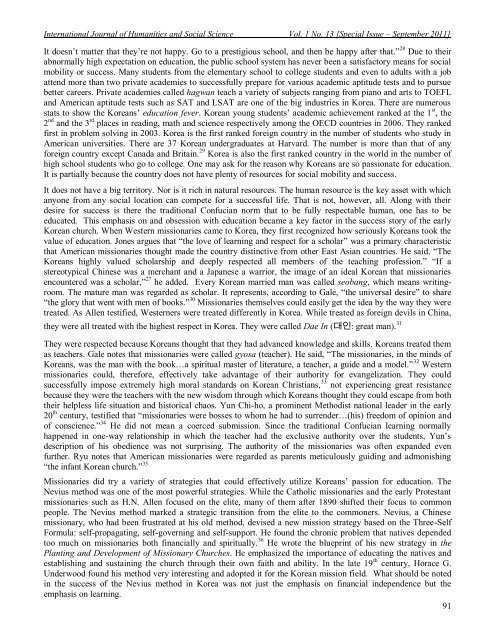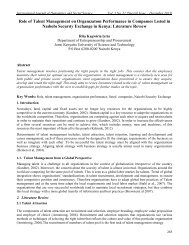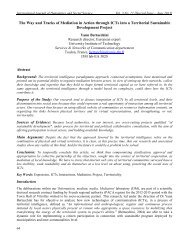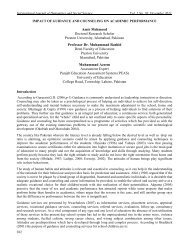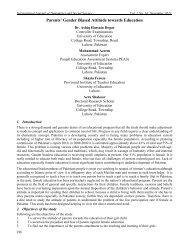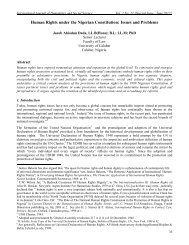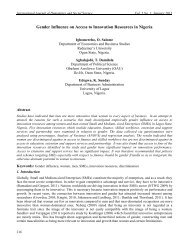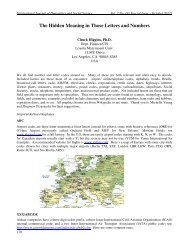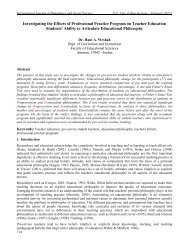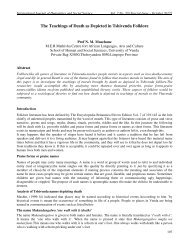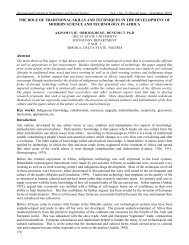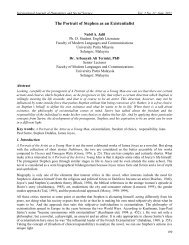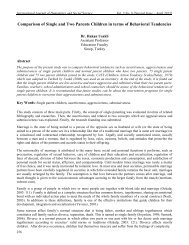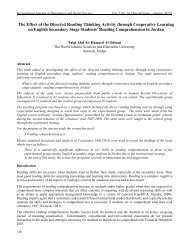Revisiting the Confucian Norms in Korean Church Growth
Revisiting the Confucian Norms in Korean Church Growth
Revisiting the Confucian Norms in Korean Church Growth
Create successful ePaper yourself
Turn your PDF publications into a flip-book with our unique Google optimized e-Paper software.
International Journal of Humanities and Social Science Vol. 1 No. 13 [Special Issue – September 2011]<br />
It doesn‟t matter that <strong>the</strong>y‟re not happy. Go to a prestigious school, and <strong>the</strong>n be happy after that.” 28 Due to <strong>the</strong>ir<br />
abnormally high expectation on education, <strong>the</strong> public school system has never been a satisfactory means for social<br />
mobility or success. Many students from <strong>the</strong> elementary school to college students and even to adults with a job<br />
attend more than two private academies to successfully prepare for various academic aptitude tests and to pursue<br />
better careers. Private academies called hagwan teach a variety of subjects rang<strong>in</strong>g from piano and arts to TOEFL<br />
and American aptitude tests such as SAT and LSAT are one of <strong>the</strong> big <strong>in</strong>dustries <strong>in</strong> Korea. There are numerous<br />
stats to show <strong>the</strong> <strong>Korean</strong>s‟ education fever. <strong>Korean</strong> young students‟ academic achievement ranked at <strong>the</strong> 1 st , <strong>the</strong><br />
2 nd and <strong>the</strong> 3 rd places <strong>in</strong> read<strong>in</strong>g, math and science respectively among <strong>the</strong> OECD countries <strong>in</strong> 2006. They ranked<br />
first <strong>in</strong> problem solv<strong>in</strong>g <strong>in</strong> 2003. Korea is <strong>the</strong> first ranked foreign country <strong>in</strong> <strong>the</strong> number of students who study <strong>in</strong><br />
American universities. There are 37 <strong>Korean</strong> undergraduates at Harvard. The number is more than that of any<br />
foreign country except Canada and Brita<strong>in</strong>. 29 Korea is also <strong>the</strong> first ranked country <strong>in</strong> <strong>the</strong> world <strong>in</strong> <strong>the</strong> number of<br />
high school students who go to college. One may ask for <strong>the</strong> reason why <strong>Korean</strong>s are so passionate for education.<br />
It is partially because <strong>the</strong> country does not have plenty of resources for social mobility and success.<br />
It does not have a big territory. Nor is it rich <strong>in</strong> natural resources. The human resource is <strong>the</strong> key asset with which<br />
anyone from any social location can compete for a successful life. That is not, however, all. Along with <strong>the</strong>ir<br />
desire for success is <strong>the</strong>re <strong>the</strong> traditional <strong>Confucian</strong> norm that to be fully respectable human, one has to be<br />
educated. This emphasis on and obsession with education became a key factor <strong>in</strong> <strong>the</strong> success story of <strong>the</strong> early<br />
<strong>Korean</strong> church. When Western missionaries came to Korea, <strong>the</strong>y first recognized how seriously <strong>Korean</strong>s took <strong>the</strong><br />
value of education. Jones argues that “<strong>the</strong> love of learn<strong>in</strong>g and respect for a scholar” was a primary characteristic<br />
that American missionaries thought made <strong>the</strong> country dist<strong>in</strong>ctive from o<strong>the</strong>r East Asian countries. He said, “The<br />
<strong>Korean</strong>s highly valued scholarship and deeply respected all members of <strong>the</strong> teach<strong>in</strong>g profession.” “If a<br />
stereotypical Ch<strong>in</strong>ese was a merchant and a Japanese a warrior, <strong>the</strong> image of an ideal <strong>Korean</strong> that missionaries<br />
encountered was a scholar,” 27 he added. Every <strong>Korean</strong> married man was called seobang, which means writ<strong>in</strong>groom.<br />
The mature man was regarded as scholar. It represents, accord<strong>in</strong>g to Gale, “<strong>the</strong> universal desire” to share<br />
“<strong>the</strong> glory that went with men of books.” 30 Missionaries <strong>the</strong>mselves could easily get <strong>the</strong> idea by <strong>the</strong> way <strong>the</strong>y were<br />
treated. As Allen testified, Westerners were treated differently <strong>in</strong> Korea. While treated as foreign devils <strong>in</strong> Ch<strong>in</strong>a,<br />
<strong>the</strong>y were all treated with <strong>the</strong> highest respect <strong>in</strong> Korea. They were called Dae In (대인: great man). 31<br />
They were respected because <strong>Korean</strong>s thought that <strong>the</strong>y had advanced knowledge and skills. <strong>Korean</strong>s treated <strong>the</strong>m<br />
as teachers. Gale notes that missionaries were called gyosa (teacher). He said, “The missionaries, <strong>in</strong> <strong>the</strong> m<strong>in</strong>ds of<br />
<strong>Korean</strong>s, was <strong>the</strong> man with <strong>the</strong> book…a spiritual master of literature, a teacher, a guide and a model.” 32 Western<br />
missionaries could, <strong>the</strong>refore, effectively take advantage of <strong>the</strong>ir authority for evangelization. They could<br />
successfully impose extremely high moral standards on <strong>Korean</strong> Christians, 33 not experienc<strong>in</strong>g great resistance<br />
because <strong>the</strong>y were <strong>the</strong> teachers with <strong>the</strong> new wisdom through which <strong>Korean</strong>s thought <strong>the</strong>y could escape from both<br />
<strong>the</strong>ir helpless life situation and historical chaos. Yun Chi-ho, a prom<strong>in</strong>ent Methodist national leader <strong>in</strong> <strong>the</strong> early<br />
20 th century, testified that “missionaries were bosses to whom he had to surrender…(his) freedom of op<strong>in</strong>ion and<br />
of conscience.” 34 He did not mean a coerced submission. S<strong>in</strong>ce <strong>the</strong> traditional <strong>Confucian</strong> learn<strong>in</strong>g normally<br />
happened <strong>in</strong> one-way relationship <strong>in</strong> which <strong>the</strong> teacher had <strong>the</strong> exclusive authority over <strong>the</strong> students, Yun‟s<br />
description of his obedience was not surpris<strong>in</strong>g. The authority of <strong>the</strong> missionaries was often expanded even<br />
fur<strong>the</strong>r. Ryu notes that American missionaries were regarded as parents meticulously guid<strong>in</strong>g and admonish<strong>in</strong>g<br />
“<strong>the</strong> <strong>in</strong>fant <strong>Korean</strong> church.” 35<br />
Missionaries did try a variety of strategies that could effectively utilize <strong>Korean</strong>s‟ passion for education. The<br />
Nevius method was one of <strong>the</strong> most powerful strategies. While <strong>the</strong> Catholic missionaries and <strong>the</strong> early Protestant<br />
missionaries such as H.N. Allen focused on <strong>the</strong> elite, many of <strong>the</strong>m after 1890 shifted <strong>the</strong>ir focus to common<br />
people. The Nevius method marked a strategic transition from <strong>the</strong> elite to <strong>the</strong> commoners. Nevius, a Ch<strong>in</strong>ese<br />
missionary, who had been frustrated at his old method, devised a new mission strategy based on <strong>the</strong> Three-Self<br />
Formula: self-propagat<strong>in</strong>g, self-govern<strong>in</strong>g and self-support. He found <strong>the</strong> chronic problem that natives depended<br />
too much on missionaries both f<strong>in</strong>ancially and spiritually. 36 He wrote <strong>the</strong> bluepr<strong>in</strong>t of his new strategy <strong>in</strong> <strong>the</strong><br />
Plant<strong>in</strong>g and Development of Missionary <strong>Church</strong>es. He emphasized <strong>the</strong> importance of educat<strong>in</strong>g <strong>the</strong> natives and<br />
establish<strong>in</strong>g and susta<strong>in</strong><strong>in</strong>g <strong>the</strong> church through <strong>the</strong>ir own faith and ability. In <strong>the</strong> late 19 th century, Horace G.<br />
Underwood found his method very <strong>in</strong>terest<strong>in</strong>g and adopted it for <strong>the</strong> <strong>Korean</strong> mission field. What should be noted<br />
<strong>in</strong> <strong>the</strong> success of <strong>the</strong> Nevius method <strong>in</strong> Korea was not just <strong>the</strong> emphasis on f<strong>in</strong>ancial <strong>in</strong>dependence but <strong>the</strong><br />
emphasis on learn<strong>in</strong>g.<br />
91


